TEQSA 2024 Conference
Very long reflections on the TEQSA conference, bicycle manufacturing, Sesame Street, and other matters
What I write at Accessible Quality is a personally satisfying form of self-expression which overlaps with a technical degree of academic freedom. It’s tricky in this context to write about the TEQSA conference. Would anything other than a complimentary affirming narrative have adverse consequences? Would a disgruntled regulator take it out on my employer? Would my employer fearing reputational damage clip my poetic wings? I’m always conscious in writing publicly, and for a growing audience, that there are risks in doing so. To be clear these are my personal reflections and have nothing to do with any organisation I am or may once have been affiliated with.
So with that introduction … here come some career limiting observations - brought to you by the letter S.
S is for the Sofitel
TEQSA 2024 was held at the Sofitel - a Melbourne hotel with conference facilities. Other iterations and antecedents of the event have been held at the Melbourne… Airport, Grand Hyatt, and Convention Centre.
The Sofitel invokes memories of the Pathways 9 Conference that I ran back in 2008. Conference organisation is a big job and bigger when one needs to organise temporary guide dog toileting facilities, stage ramps, more accessible rooms, dj’s and discos.
Contrasting Sofitel events (and earlier TEQSA conferences) my view is that a mixed format event works best. TEQSA 2024 was a full plenary conference … so no niche or specific topics to explore or chose from. There were 3 concurrent pre-conference workshops to choose from - so there was some choice - but the main program was a big room with a line up of speakers and limited choice for interaction beyond the breaks and mediated Slido questions. The venue itself is nice - and easy to get to (for me) - but I’d much prefer a more chaotic conference program where the set pieces are kept to a minimum and there is an option for nuanced discussion in smaller groups on specific topics. Others in breaks shared this view - noting that the more granular one gets - the quality of content can deteriorate pretty quickly.
S is for Sustenance
Food was A++
Having barista coffee carts is the new conference benchmark and superior to the lukewarm warm brewed coffee urns of conferences past.
As a sign of commitment to safety …. dietary requirements ran to 16 pages of specific attendee requirements and whilst the standard fare was super dooper - I wish I could have sampled the alternatives which looked even more delicious but couldn’t get past the dietary requirements bouncer.
S is for Social Media
A sign of the times is that Musk’s Twitter / X has killed academic engagement. As far as I can tell I was the only one live tweeting - and switched to Blue Sky half way through the day. I did hear that one of my tweets got picked up in a parallel meeting / event so someone was engaging - but it seems clear that if you don’t pay for a blue tick you are algorithmically suppressed and there is little point in posting. TEQSA were not promoting hashtags or social media engagement either.
There are far fewer people on alternatives of Mastodon or Blue Sky but there was at least some intra-conference social media dialogue on Blue Sky (thanks Claire). One way or another higher ed types will need to find a different means of communicating with each other to advance quality - because the utility that Twitter once had for this has been in a sustained doom spiral.
Check out my #TEQSA2024 socials if you dare… https://x.com/MattBrettLTU and https://bsky.app/profile/mattbrettltu.bsky.social
S is for Slido
Good to see the organisers use some standard T+L tech for engagement through use of Slido - and far better than the proprietary conference app that has been used in earlier TEQSA conferences.
I was gutted my cutting edge questions didn’t get upvotes to get asked … but you know … democracy …. good when you win … terrible when you lose as Trump has demonstrated in 2016, 2020 and 2024. For those that got the mega upvotes …. an opportunity lost for shameless self-promotion and personal brand recognition as only a few brave souls were prepared to put their names to their questions.




S is for Socialisation
The best and worst thing about any conference with 1000+ attendees is the interaction with others. Had some unexpected positive and insightful conversations with new faces. Also some awkward conversations where my social defects were on full display. Lots of good people and generally there was a good vibe, and nice to see people that I’ve worked with closely on zoom in person. Several zoom collaborators were taken aback at times that I wasn’t wearing my glasses. Play spot the 10 differences in the pics below.
Most of the conversations were in a crowded food hall where noise levels were high and my hearing loss put my lip reading skills to the test. The cognitive load for this is high and tiring, particularly when having to sit through 6 hours of speeches.
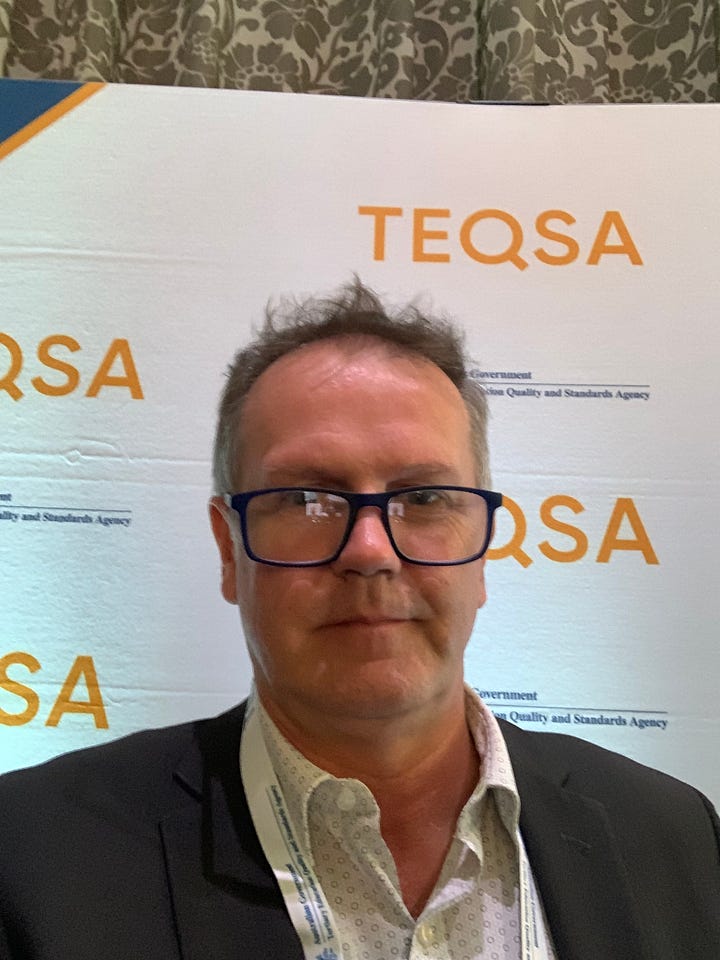
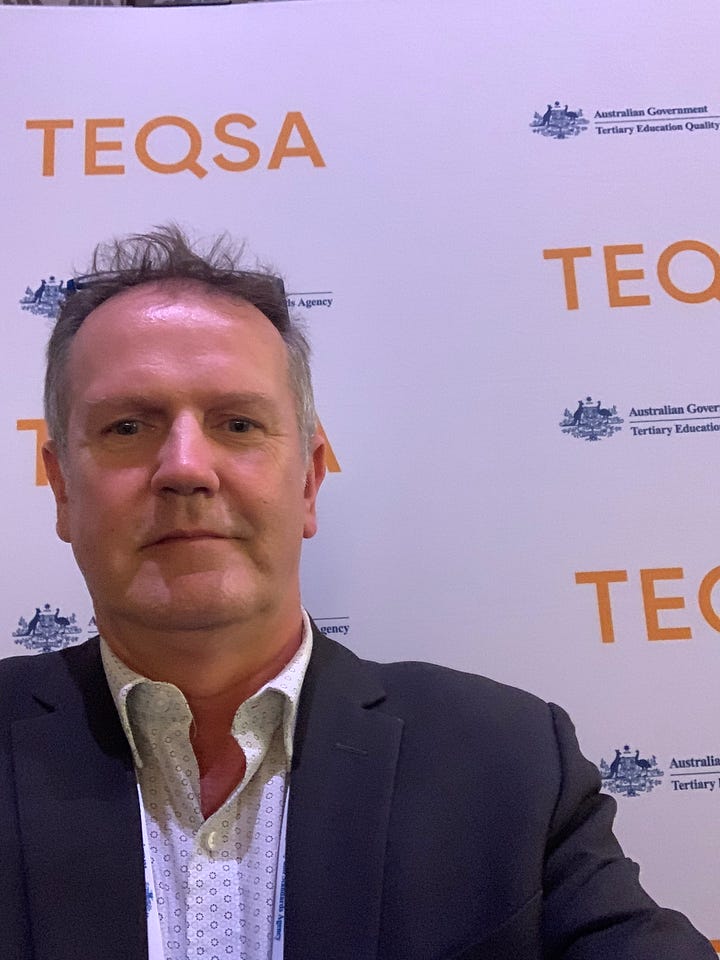
S is for Speakers
Notwithstanding the comments above about the format and structure of the event - and preference for a more academic-like event with break out sessions - the line up was good. Generally speaking the lower down the food chain the speaker - the more authentic and insightful the commentary. One attendee asked me what might explain why the Auslan interpreters seemed a little subdued after the lunch break… could have been fatigue … could have been a dodgy high-up-in-the-food-chain-word-salad they were processing?
S is for Stance
The best conversations I had gave me insight into TEQSAs regulatory stance and how it is evolving. TEQSA (as several conversations highlighted) is an agency that is the blend of two cultures comprised of staff drawn primarily from two organisational traditions:
public servants who might perceive TEQSA as a small agency that is one of numerous roles in the broader public service they could occupy and who are not experienced in the vagaries of higher education
higher education staff who have transitioned to TEQSA who are familiar with values, cultures and systems of academic oriented institutions but who find themselves in a more constrained public service context
Some of the changes in regulatory stance - ie- a shift from evidence of standards compliance to effective self assurance practices are sound - but full implementation is impeded but the cultural challenges above, and what I understand to be sub-optimal staff turnover and vacancy rates. What ever Mary Russell is doing as CEO is working as I think their direction is right … it might, however, take a little longer to bed down an integrated culture.
The conference structure is perhaps a manifestation of regulatory stance and cultural misalignment. TEQSA is not equipped to run a more academical conference. The sequence of set pieces in plenary formats is a safer bet in terms of a stance. TEQSA is trying to keep its distance from the sector to avoid regulatory capture, whilst still trying to engage the sector with relevant content. It’s a hard balance to strike and also logistically more manageable to play safe given the number of participants.
My preference for future conferences would be to break it up into multi-day format - outsourcing the academical stuff to sector volunteers and letting TEQSA run the set piece plenaries with dignitaries and high up the food chain operatives.
S is for Stakeholders
The implication of sections above is that it is hard to keep all stakeholders satisfied. Small providers are grappling with the regulatory basics and need to have explicit guidance on what to do. Established large providers are more interested in esoteric and abstract conversations about the nature of higher education and its regulation and how this is managed at scale. Neither end of this continuum can be fully satisfied so we have reasonably (intellectually) safe set pieces that avoid more crunchy and provocative engagement. Nonetheless the food and conversations are great - so everyone is a winner. As an added bonus TEQSA makes a bit of extra coin so that it doesn’t have to increase its cost recovery fee structure too much ($500k revenue in 2023 and $150k in 2022 see annual report p107).
S is for Standards
To my mind this is what the conference could be about. TEQSA regulates against a standards framework that has proven to be reasonably stable - but some of these standards warrant more detailed interrogation and reform. The higher education standards framework is just one of many standards frameworks that need to be adhered to in parallel by the sector.
Research is a good example of this with a proliferation of regulatory activity like foreign interference that isn’t adequately covered in the threshold standards. TEQSA conferences barely mention research nor its regulation but have gone to elaborate lengths to describe arcane regulatory business processes downstream from key regulatory settings. This might be my esoteric academical orientation in play … but I’d really like to see more interrogation of standards and how they might need to evolve than repeatedly quoting standard x.y, or q.r which always does my head in.
S is for Specific Sessions
Academic Risk
Pre conference session put forward a ATAMM model (Articulate risk - Treat risk - Assess risk - Monitor risk - Mitigate risk) specific for academic risk.
The view put forward was that enterprise risk and management tools are different from and not fit for academic risk purposes, which need to be managed differently. I disagree with this approach and think that enterprise risks for higher education need to integrate academic risk. Generic enterprise risks are not fit for university purposes … but better to do the hard yards to blend and integrate the academic than run them as parallel processes.
A future Accessible Quality piece will do a deep dive on this issue - but for now - I think there is a real risk that TEQSA forms a view that the only way to manage academic risk is to separate it from enterprise risk undermining those that are doing the good work in integration.
Governance
To me the academic risk session and direction does not ensure that governing bodies are adequately equipped to take responsibility for the enterprises they are governing. It entrenches the evolution of councils towards business expertise with potential misalignment with the core academic enterprise for which they are responsible.
This was particularly striking in the governance session when one Chancellor repeatedly referenced 5 key functions (strategy and finance, VC appointment and management, compliance and health and safety, culture, and social licence) but didn’t include within these functions something resembling core academic functions and values. To their credit they did highlight that university councils are more complex and challenging than other boards …. but all the more reason to place the academic front and centre rather than using the generic governance roles and responsibilities as the framing.
Productivity
Opening keynote from Danielle Wood and probably my favourite snippet from the event was all about productivity. In 1900 it took about 460 hours to make a bicycle - now it takes about 6 and the bicycles are lighter more durable and higher quality. That’s productivity (and innovation and global supply chains) in action over the long term and picks up on higher educations contribution to productivity - human capital - research and innovation - and global linkages.
We have a broad productivity problem we need to address as it has not been growing. There are also specific details associated with this problem.
Year 12 completion is going backwards.
The US highlights problems with a growing class of college educated adults and growing sense of resentment for those left behind that some politicians have been very successfully targeting (look at the coincidental colour choice for the illustration below).
The translation of research into innovation and impact is hard and getting and needs money. Researchers spend more and more time on chasing grants and admin doing research…. a productivity killer.
The wave of populism and geopolitical tension makes it harder to grow global linkages - particularly through international alliances education - and we don’t support international students as well as we might.
Danielle went on to describe the need for more skills and better quality …. with implied critique of providers with higher attrition. I wasn’t enamoured with this line of reasoning as we won’t grow the sector to the scale we need to and at the quality we need to if the only conceptual reference point we rely upon is (unstated but implied) Go8 levels of retention. Nonetheless, Danielle was very good … one of the best speakers at the conference.
VET HE Harmonisation
This was my pig in muck session - getting into technical policy discussion about differences in policy and regulation for VET and HE. By conference end the consensus was that harmonisation is a dirty word - but alignment was more palatable.
VET and HE are different and even if ASQA and TEQSA merged different forms of delivery will require nuanced regulatory treatment. There is a risk that a one size fits all regulatory approach will not be fit for no purpose. This won’t solve the regulatory compliance challenges for providers that are dual sector. My personal view is that these problems should not be positioned as the central problem across all RTO TAFE NUHEP and University sectors that needs resolution.
Better fit for purpose regulation is the way to go - and from what I know - all sectors could benefit from reform in regulatory approach. The best take in this in my view was JSA David’s commentary on credit recognition. What we need is more efficient ways of having relevant learning and skills recognised across sectors. As things stand the Higher Ed Standards are all about not being disadvantaged in demonstrating learning outcomes …. But this is not counter balanced by not being disadvantaged in paying for learning outcome acquisition that you already have.
Students
Always good to have students in the conversation - but I think there are structural changes to event format that could better showcase their talents. One panel session gives some insight - but it might have been nice - for example - to provide opportunities for student voice to respond to each session’s Q+A slot. I feel that legitimate student questions weren’t upvoted via Slido and there were limited alternatives for their engagement.
It was nice to see the PWI data get profiled by Lisa Bolton from the Social Research Centre along with reminder that with hundreds of thousands of responses to QILT surveys over time - we can be doing better to interrogate the data. She provided some good examples of the cross tabs that are possible.
Self-Assurance
This is some ways is the big shift TEQSA has made over recent years and we heard from a private and public uni on their self-assurance journeys and experiences. I have formed the view that TEQSA have pushed the streamlined assessment of self-assurance a little too far and have introduced systemic risks to quality across the sector through the revised approach. For most providers there is one crack that TEQSA get to review how things are tracking every seven years. Streamlined self-assurance is much better than proof of compliance, but it needs work.
S is for Speeches
I played Minister Clare Bingo for his speech and only got 8 of the 15 … so didn’t get to shout out in the crowded auditorium. It’s the second time I have seen Minister Clare up close and he’s still a good communicator - but seemed more subdued and defensive today. The promise of “real HELP” for HELP debts …. if they win the election… suggests the government is getting nervous about where things are heading in 2025. Tony Cook repeated Ministers talking points to round out the day… by which time everyone (including myself) was ready for drinks and nibbles.
S is for so long
I have a feeling this’ll be my last TEQSA conference, at least for a while. I’ve got research and scholarship I want to do on policy and standards critique and redesign rather than interpretation and implementation space and I’ll be putting my eggs in that basket for the next few years at least.
So TEQSA - it’s been a blast - thanks for all the fish.

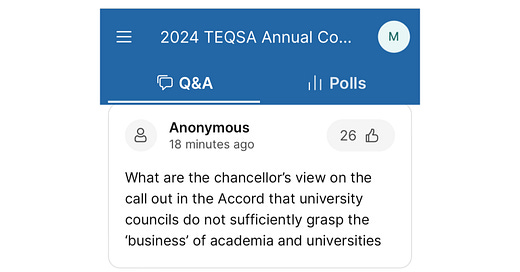



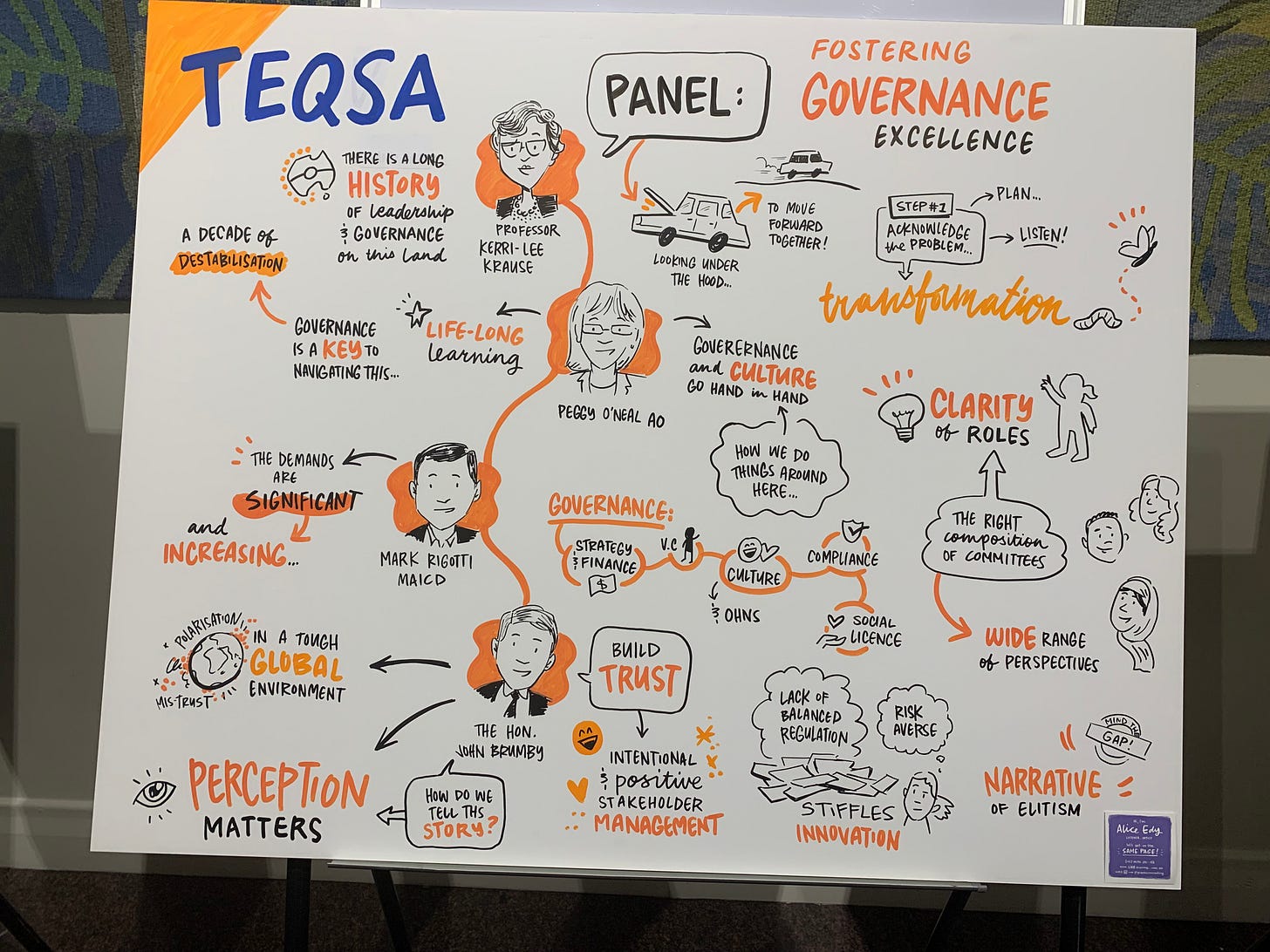
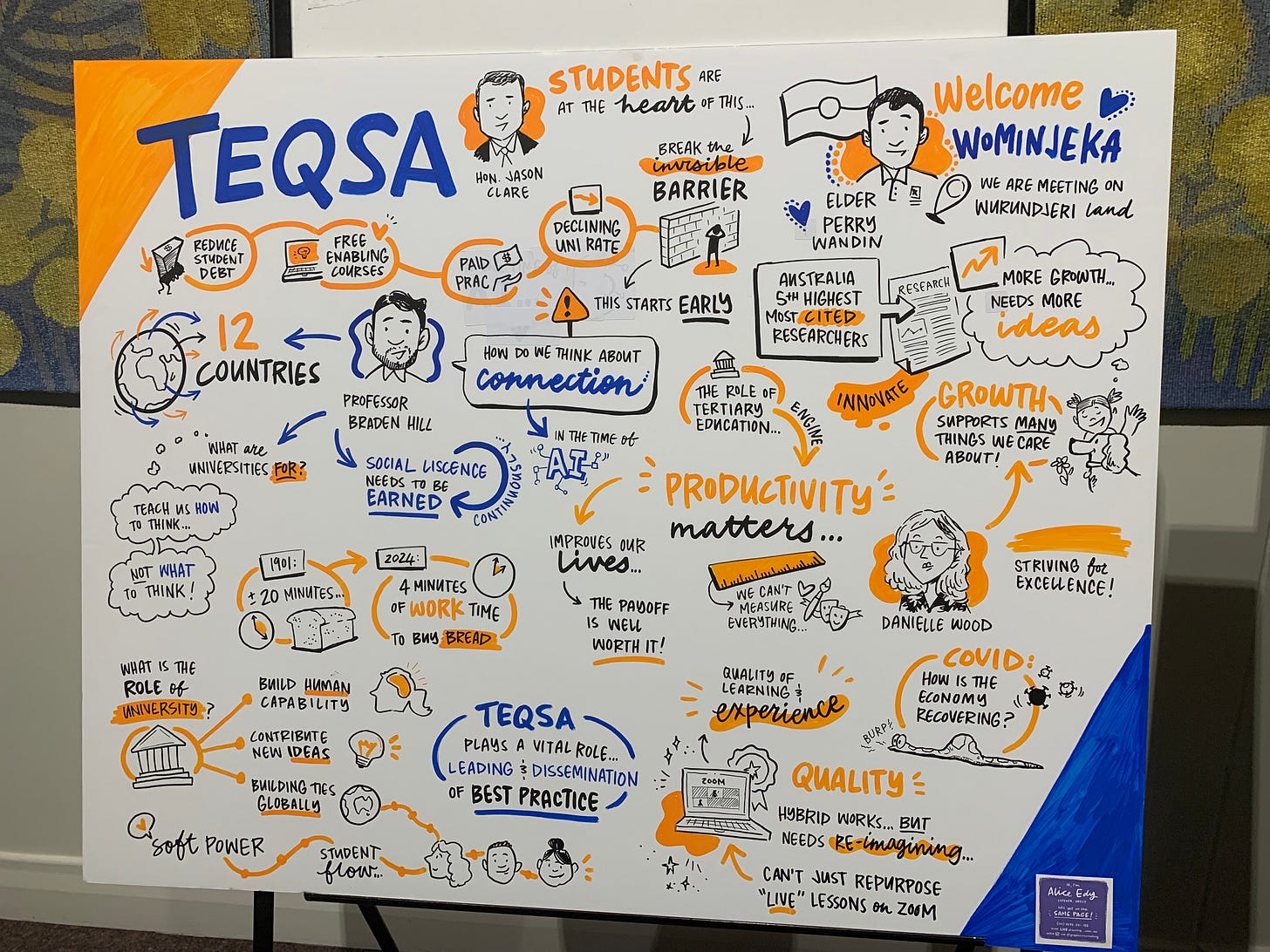
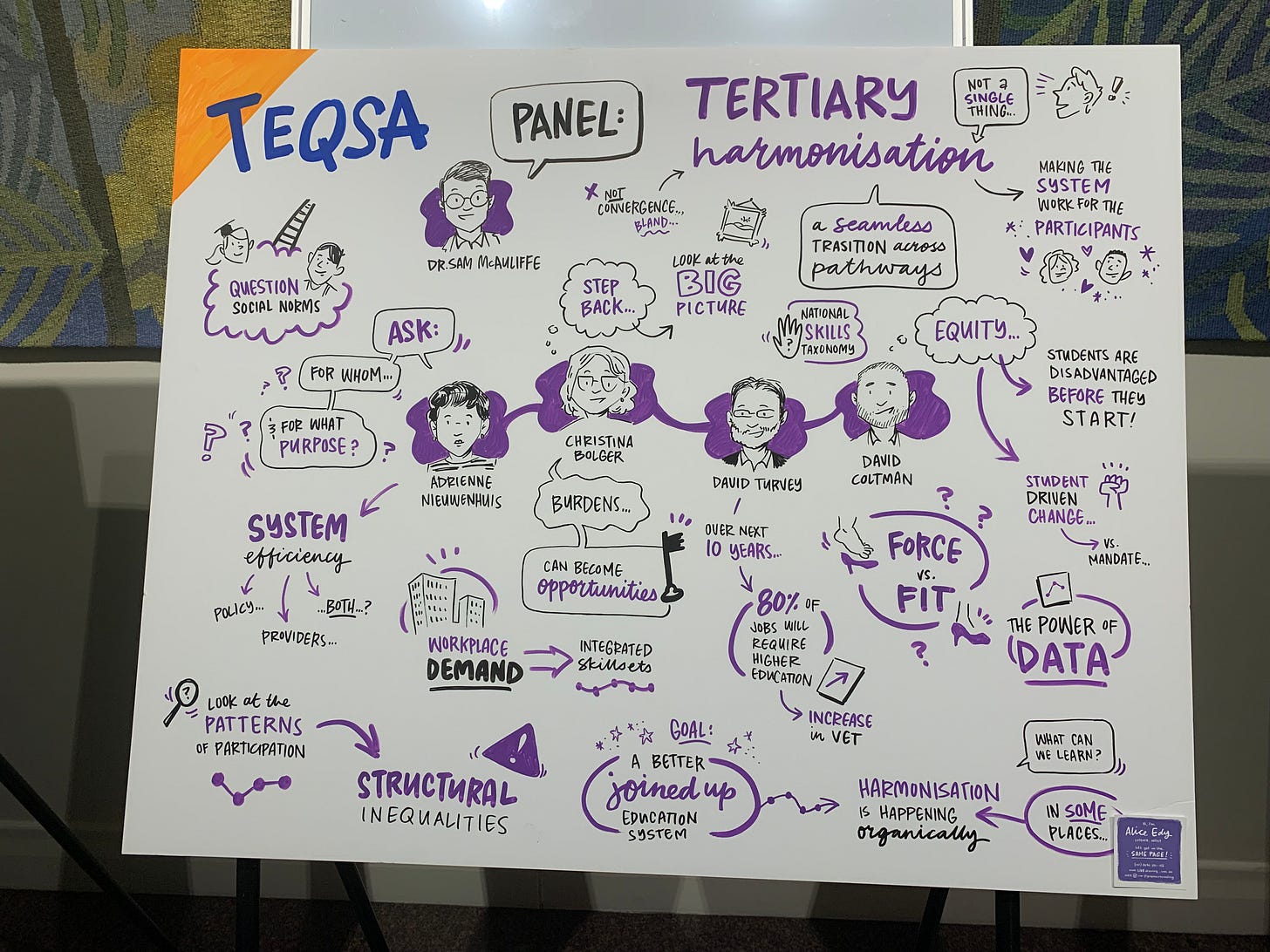
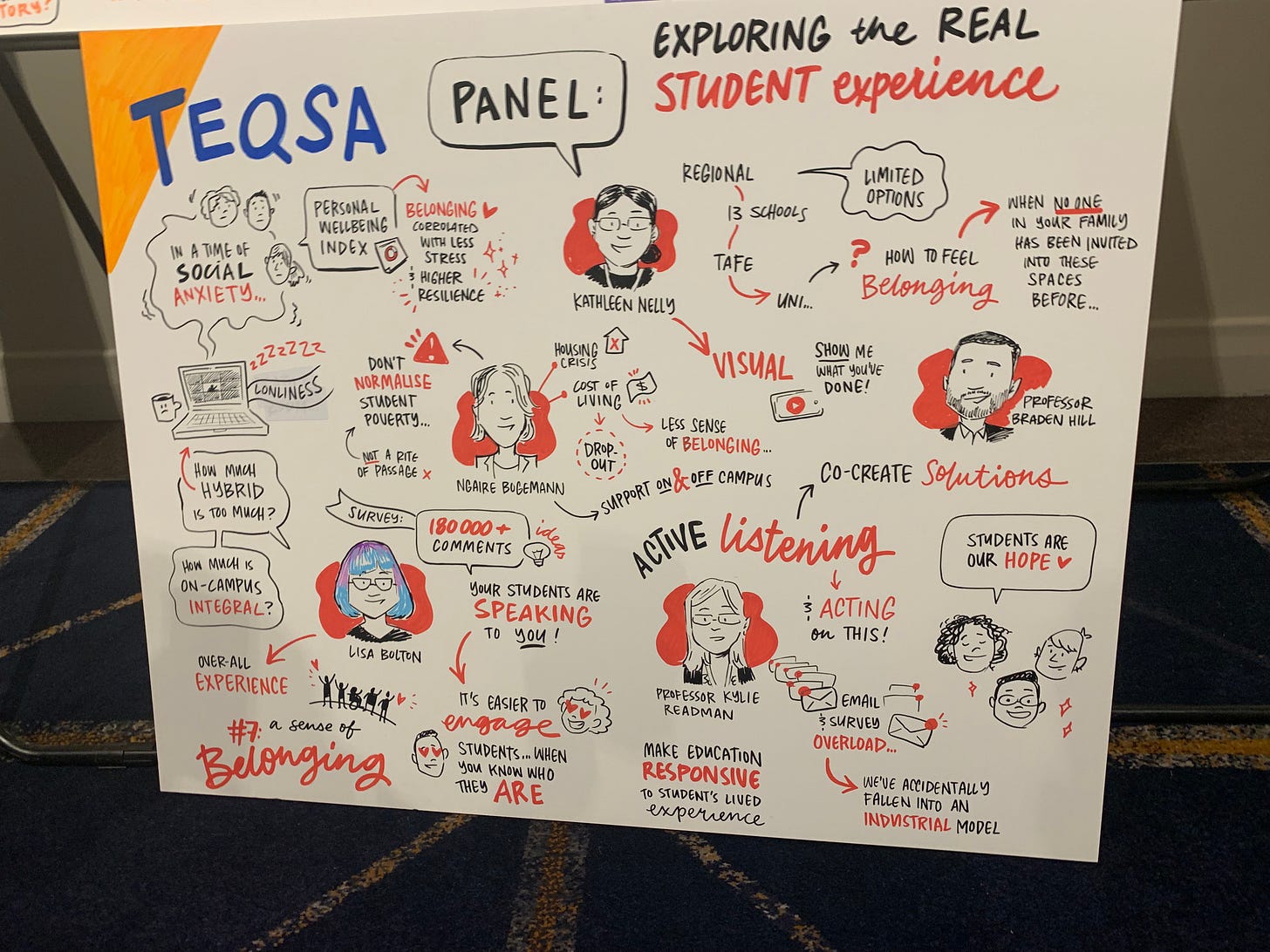
You write so well Matt - always a laugh, two or three in there! I missed it this year, but I now strangely feel like I was there..!
Thank you for this, as others have said you write so well. Re your comment about Go8 levels of retention: yes, absolutely. Go8s like my employer have high retention because we select students well, ones who are conventionally good at conventional study under conventional circumstances. The unconventional circumstances have the potential to add a great deal of value to students and society. And attrition isn't always bad, I would love to know if Stanford got punished for a couple of dropouts from their PhD program at the turn of the century when Brin and Page chose to develop Google instead, presumably using some of what they'd learned so far